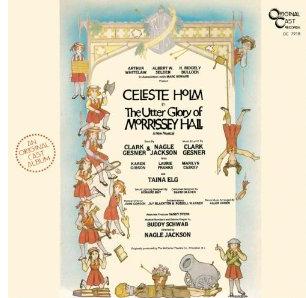|
Recently, I mentioned the musical, You're a Good Man, Charlie Brown, which had a wonderful and joyous score by a fellow named Clark Gesner. (He also wrote the book, though used a pseudonym, John Gordon, for the off-Broadway production. When the animated TV production was done, however, his real name took front and center.) Clark Gesner's name, real or otherwise, isn't well-known to most people -- and I include myself among them. So, it was a great deal of pleasure that I came across the album to another musical he wrote in 1979, 12 years after his famous hit smash. The Utter Glory of Morrissey Hall. Again, he did the music and lyrics, and he also collaborated on the book with Nagle Jackson. Unfortunately, the show didn't have anywhere the success of his first effort. Actually, it didn't have the success of any show ever on Broadway and closed after opening night The score isn't remotely bad. It's not wonderful, but has several nice songs and is thoroughly professional. It's just okay, though. But better than one would think for a one-night run. It had a big name for a star, Celeste Holm, though not necessarily a big Broadway name as the '80s were about to arrive. She plays the headmistress at a English school for young girls.
All this aside, there is one song in the show that I dearly love. And what's odd about it is that it's not really a song at all. It's largely a monologue that's set so cleverly to music -- and performed so wonderfully by Marilyn Caskey -- that it becomes almost a soaring song that's hilarious and heartbreaking. Yet when you step back, you realize that there isn't a single rhyme in it. The number is "Elizabeth's Song." Elizabeth being the secretary to the headmistress of the madhouse and its outlandish goings-on. She doesn't want to be there -- doesn't even want anyone to think she would want to be associated with all these swirlings of young girls and rivalries and fussy teachers -- and she has other, far more meaningful goals in her life, although alas most of those are likely past her at this point. But there's one goal that she still has outside hopes for. And so, she steps away from her duties and addresses the audience directly, pouring out her heart to them, just to make sure they know. (Happily, we later discover, she does have a gentleman who adores her. As, I suspect, does most of the audience after this number.) Did I say that I dearly love this song?
0 Comments
Leave a Reply. |
AuthorRobert J. Elisberg is a political commentator, screenwriter, novelist, tech writer and also some other things that I just tend to keep forgetting. Feedspot Badge of Honor
Archives
June 2024
Categories
All
|
|
© Copyright Robert J. Elisberg 2024
|







 RSS Feed
RSS Feed